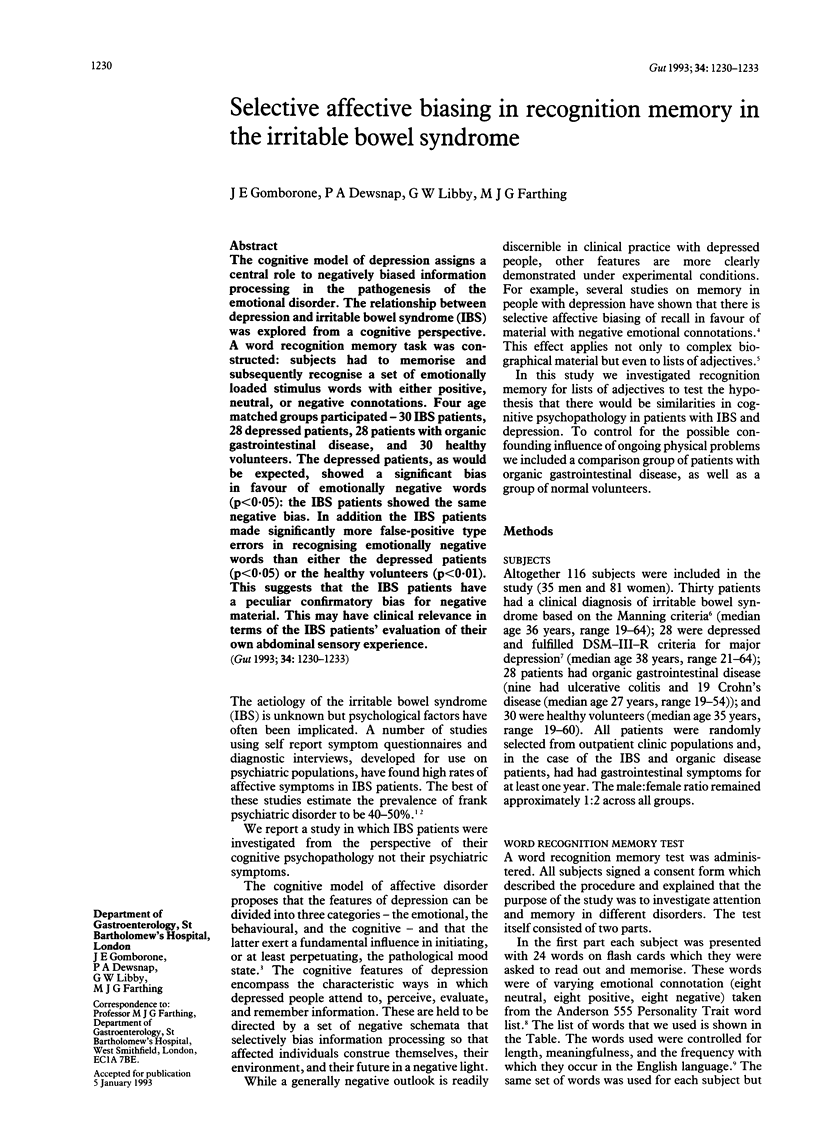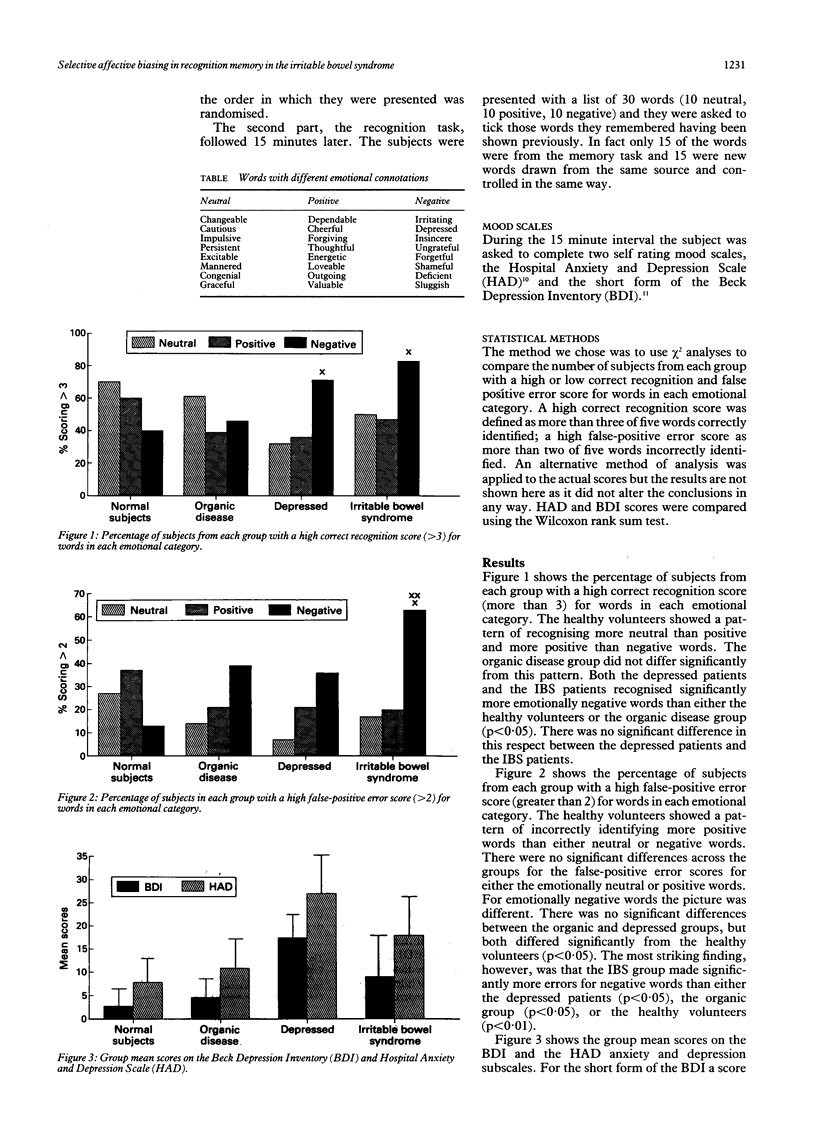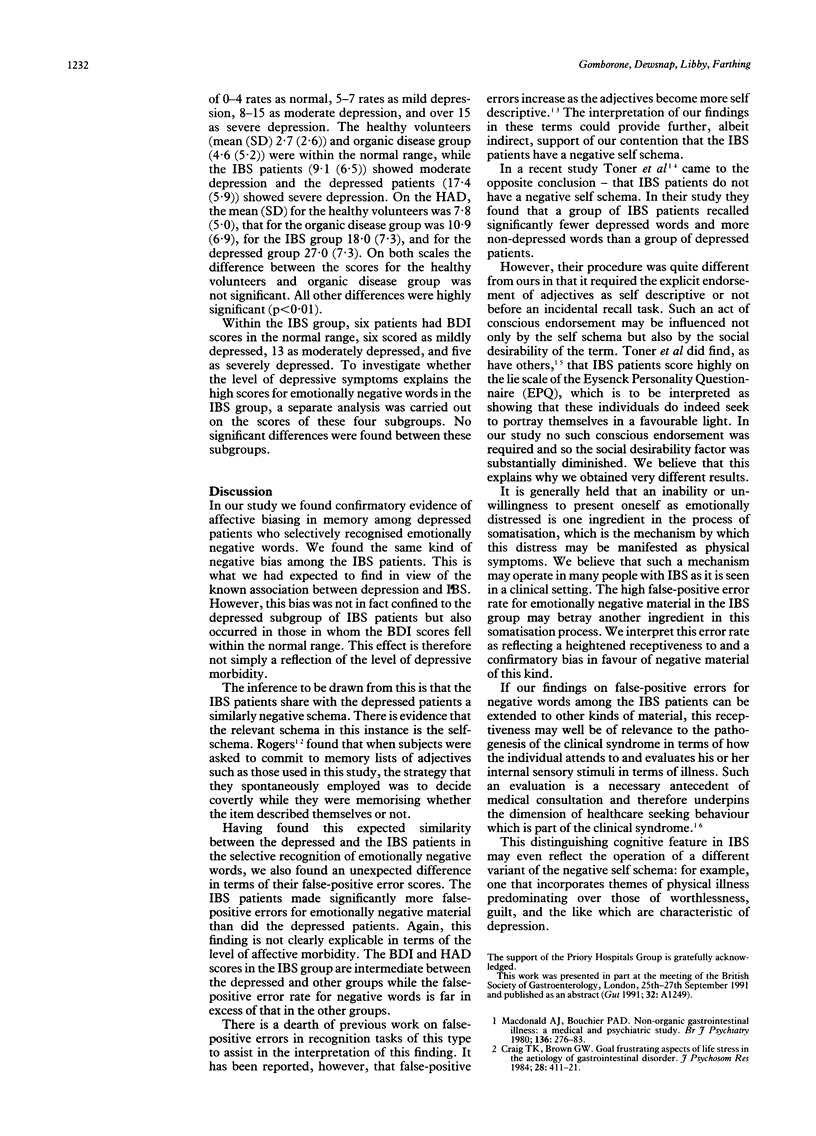Abstract
The cognitive model of depression assigns a central role to negatively biased information processing in the pathogenesis of the emotional disorder. The relationship between depression and irritable bowel syndrome (IBS) was explored from a cognitive perspective. A word recognition memory task was constructed: subjects had to memorize and subsequently recognise a set of emotionally loaded stimulus words with either positive, neutral, or negative connotations. Four age matched groups participated--30 IBS patients, 28 depressed patients, 28 patients with organic gastrointestinal disease, and 30 healthy volunteers. The depressed patients, as would be expected, showed a significant bias in favour of emotionally negative words (p < 0.05): the IBS patients showed the same negative bias. In addition the IBS patients made significantly more false-positive type errors in recognising emotionally negative words than either the depressed patients (p < 0.05) or the healthy volunteers (p < 0.01). This suggests that the IBS patients have a peculiar confirmatory bias for negative material. This may have clinical relevance in terms of the IBS patients' evaluation of their own abdominal sensory experience.
Full text
PDF



Selected References
These references are in PubMed. This may not be the complete list of references from this article.
- Anderson N. H. Likableness ratings of 555 personality-trait words. J Pers Soc Psychol. 1968 Jul;9(3):272–279. doi: 10.1037/h0025907. [DOI] [PubMed] [Google Scholar]
- Beck A. T., Beck R. W. Screening depressed patients in family practice. A rapid technic. Postgrad Med. 1972 Dec;52(6):81–85. doi: 10.1080/00325481.1972.11713319. [DOI] [PubMed] [Google Scholar]
- Blaney P. H. Affect and memory: a review. Psychol Bull. 1986 Mar;99(2):229–246. [PubMed] [Google Scholar]
- Derry P. A., Kuiper N. A. Schematic processing and self-reference in clinical depression. J Abnorm Psychol. 1981 Aug;90(4):286–297. doi: 10.1037//0021-843x.90.4.286. [DOI] [PubMed] [Google Scholar]
- Latimer P., Sarna S., Campbell D., Latimer M., Waterfall W., Daniel E. E. Colonic motor and myoelectrical activity: a comparative study of normal subjects, psychoneurotic patients, and patients with irritable bowel syndrome. Gastroenterology. 1981 May;80(5 Pt 1):893–901. [PubMed] [Google Scholar]
- MacDonald A. J., Bouchier I. A. Non-organic gastrointestinal illness: a medical and psychiatric study. Br J Psychiatry. 1980 Mar;136:276–283. doi: 10.1192/bjp.136.3.276. [DOI] [PubMed] [Google Scholar]
- Manning A. P., Thompson W. G., Heaton K. W., Morris A. F. Towards positive diagnosis of the irritable bowel. Br Med J. 1978 Sep 2;2(6138):653–654. doi: 10.1136/bmj.2.6138.653. [DOI] [PMC free article] [PubMed] [Google Scholar]
- Rogers T. B., Kuiper N. A., Kirker W. S. Self-reference and the encoding of personal information. J Pers Soc Psychol. 1977 Sep;35(9):677–688. doi: 10.1037//0022-3514.35.9.677. [DOI] [PubMed] [Google Scholar]
- Sandler R. S., Drossman D. A., Nathan H. P., McKee D. C. Symptom complaints and health care seeking behavior in subjects with bowel dysfunction. Gastroenterology. 1984 Aug;87(2):314–318. [PubMed] [Google Scholar]
- Toner B. B., Garfinkel P. E., Jeejeebhoy K. N., Scher H., Shulhan D., Di Gasbarro I. Self-schema in irritable bowel syndrome and depression. Psychosom Med. 1990 Mar-Apr;52(2):149–155. doi: 10.1097/00006842-199003000-00003. [DOI] [PubMed] [Google Scholar]
- Zigmond A. S., Snaith R. P. The hospital anxiety and depression scale. Acta Psychiatr Scand. 1983 Jun;67(6):361–370. doi: 10.1111/j.1600-0447.1983.tb09716.x. [DOI] [PubMed] [Google Scholar]


